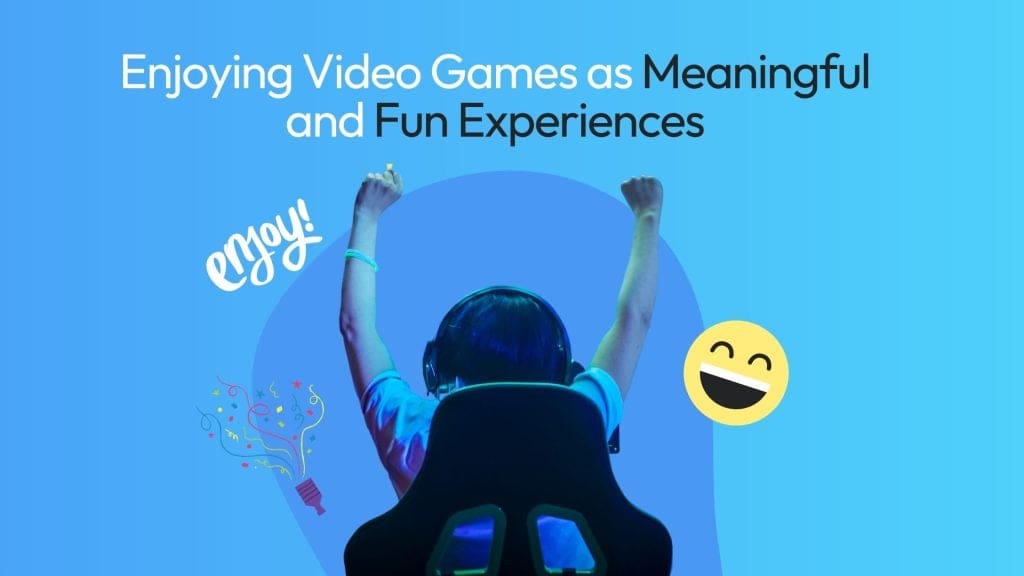Video games are thought of as mostly fun virtual experiences. Can playing video games be a meaningful experience too? What’s the difference between fun and meaningful gaming?
We can all agree that video games are fun. It’s fun to beat your opponent in a game of Mario Kart. It’s fun to win a Battle Royale in Fortnite. It’s fun to build your own virtual world in Roblox. These experiences may be more enjoyable to some than others, sure (my kids will always get far more enjoyment out of decorating their virtual digs in Roblox than I will, no contest), but almost anyone who sits down and spends time gaming on any platform will enjoy the experience.
But can video games being meaningful exerpiences, too? Beyond spending time with a video game mindlessly clicking away or working to a single goal such as beating your opponent or the game, can games illicit stronger feelings or a deeper satisfaction than we typically give them credit for.

Video games as fun experiences
Researchers, actually, answer this question with a resounding yes. In 2016, researchers at Butler University took a deeper dive into the world of video games to try and understand the connection gamers form with their online experiences.
Video games, when they were first introduced, were generally meant to be purely entertaining. As a kid, you may have played Pac-Man and thoroughly enjoyed levelling up each time you made it through the maze without running into a ghost, but you may be wondering how you could deduce anything meaningful from that game play. You likely didn’t form any sort of meaningful connection to the game, you were simply playing to beat another player’s high score.
The same study notes that, in games such as Grand Theft Auto, it might also be hard to make a meaningful connection because the narrative is written in a way that prohibits you from doing so. In Grand Theft Auto, you engage in raucous behavior and win by stealing and destroying. Fun? Probably so, for many players. Meaningful? Well, hopefully not.
Video games as meaningful experiences
Video games, like all media though, have evolved significantly since their inception. While there are still games you can play that are meant to be purely entertaining, there are more and more games these days that are meant to incite more meaningful play. The Butler study notes that, so often in today’s popular video games, the games “most often simulate being a character rather than simply viewing a character.”
Indeed, today’s games have more complexity and immersion than their predecessors. In games such as World of Warcraft, the gamer becomes the character, and embarks on a journey to become the best in the game. In these types of video games, when a gamer “becomes” the in-game character, they may feel more immersed in the game. Sometimes, a gamer is faced with a moral decision to make when gaming, or a player might watch another player with whom they have a connection die in the game. These sorts of experiences can invoke a deep emotional response in the player in real life, causing the experience to be more meaningful than a simple game of Pac-Man might.
So often, when we do things such as read books or watch movies, we simply watch a character make decisions and then watch that person deal with the fall out. Although it may invoke an emotional response, the viewer isn’t deeply imbedded in the plotline because they weren’t part of the decision the character made to bring them to some crucial point. In meaningful video game play, however, the player made the decision to get the on-screen player to the point they are at. Video gamers can be more invested in the on-screen action because they directly made the choices for the character that brought them to a crucial point.
Meaningful video game play vs. fun video game play
Video game play can most certainly be fun but not meaningful, and it could also be meaningful but not fun, if a favorite player dies or a difficult decision must be made. But what is the benefit to each type of game play?
Overall, there are many benefits to playing video games. From increased cognitive functioning to better mental focus, video gaming can be a good thing for kids and adults. While it is important to find a balance between physical activity and gaming activity, there are most certainly benefits to both!